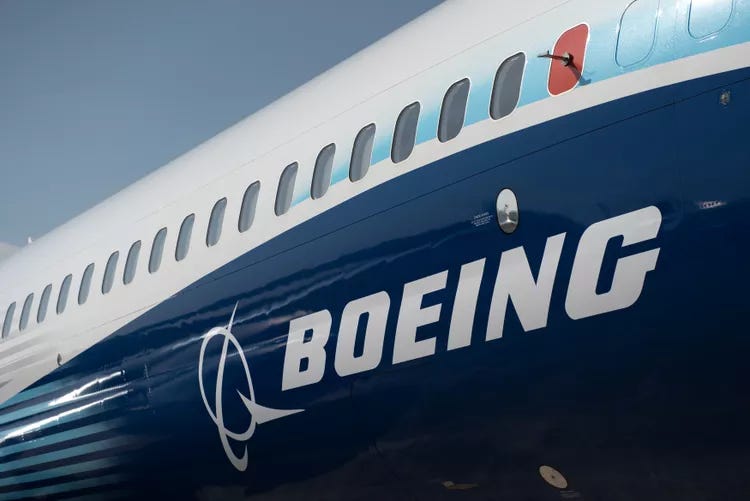Update: Today Frank Schronz, the last CEO at Boeing who honored their great tradition of committment to company culture, died at age 92.
I have been tracking Boeing’s management decisions for years, so in a busy week of news, one item jumped out at me: the decision by Boeing’s shareholders to retain departing CEO Dave Calhoun on the Board of Directors, and approve his $32.8 million paycheck.
Since Calhoun became CEO in 2020, Boeing has lost more than $23 billion, including $2.2 billion last year. Some of these losses stemmed from a pair of deadly 737 Max crashes that predated his tenure as chief executive, but occurred while he was an influential member of the board. Going forward, Boeing faces a sprawling crisis that includes multiple investigations, possible criminal prosecution for past actions, significant fines, a continuing production slump, and a series of high-profile aircraft failures, ranging from blown out doors to wheel collapses.
The company’s struggles– to use the time-honored journalistic euphemism– have, according to Morning Star, complicated airline operations around the world. This has resulted in higher fares for travelers, feeding inflation. In the US, production shortages have cut the number of non-stop flights and led to longer connection times, as well as increased airport delays.
But what struck me most about last week’s news was that Calhoun’s support came from shareholders. Not from Boeing’s board or some management committee.
These are the very people who’ve seen the value of their holdings fall by 27%. And whose proxy advisor, Glass Lewis, recommended that they vote against the re-election of Calhoun and two other directors.
According to NBC:
“The shareholder meeting was conducted online and heavily scripted. A moderator posed a handful of shareholder questions, which Calhoun and Steven Mollenkopf, the new chairman of Boeing's Board of Directors, fielded by seeming to read their answers.”
The reporter added dryly, “None of the questions were too pointed.”
NBC also noted that Calhoun told those assembled that a team from Boeing would be meeting with regulators from the FAA “in a couple of weeks” to present their latest recovery plan.
Despite the scripted nature of the meeting, one might have expected the shareholders to at least consider their own financial interests in deciding whether the departing CEO deserved to keep his seat on the board. And once again to be richly rewarded for a subpar performance primarily justified by a lot of optimistic talk.
I was puzzling over the irrationality at play here when a presentation by a friend and colleague, the strategy consultant Michael Canic, suggested an answer. Michael studied with the great Daniel Kahneman, whose Nobel-winning work on what has subsequently become known as behavioral economics had a foundational influence on our collective understanding of how people make decisions– especially decisions related to money. Michael now specializes in helping companies incorporate Kahneman’s insights into how they think about and plan for change.
Before Kahneman, economists routinely assumed that people made economic decisions based upon the laws of probability as well as rational calculations of self-interest. But in a series of elegant experiments, Kahneman demonstrated that this is not the case. Instead, our decisions are routinely shaped by the complex interaction of irrational factors: hope and fear, willed belief and skepticism, short-term desires and vestigial loyalties. All mixed with a good dose of aspiration and idealized self-image.
The consequences of this illogical stew include people voting for candidates who can reasonably be expected to undermine their financial interests; befriending those they have every reason not to trust; assessing that a weekend in Las Vegas might be a plausible way to recoup a financial loss; or convincing themselves that buying an unaffordable pair of shoes should actually be considered an “investment.”
We make these common errors of judgment– some minor, others disastrous– because emotions, desires, aspirations, and tribal identification skew our ability to calculate actual risk against longed-for reward. This undermines our ability to take a clear-eyed look at what– and who– might actually serve us and the people we care about.
Kahneman famously named this complex welter of non-rational considerations cognitive biases. This now-familiar term describes what happens when we make decisions based on what we want to happen.
For me, this is the most likely explanation for why the shareholders at Boeing decided to disregard their company’s recent history as well as the counsel of their own proxy advisor. They simply want to believe the company has a plan to turn things around. In this way, the familiar triumph of hope over experience continues to undermine one of the most inspiring and iconic companies the world has ever known.
Like what you’re reading? Click here to order my most recent book Rising Together from Amazon. Also available from your favorite bookseller. Thank you for your support!






One of my sisters worked for Boeing her entire adult life. She is horrified.